B2B Marketing Trends in 2024: Analysis of Linkedin’s Benchmark Report
In an unexpected turn of events, the world of B2B marketing is experiencing a surge in budget allocations. As the CMO of CIENCE, I found this trend surprising. Despite the prevailing economic downturn and the specter of rising inflation, six out of ten B2B leaders have reported year-on-year increases in their marketing budgets. Even more surprising, over two-thirds anticipate further budget increases in the coming year. This counterintuitive trend signals a shift in the business landscape, one that is driven by the need to grow, even in the face of adversity.
This intriguing development sets the stage for the LinkedIn 2023 B2B Marketing Report. A comprehensive analysis of the global state of B2B marketing, the report delves into the strategies, challenges, and triumphs of B2B leaders in an increasingly digital and interconnected marketplace. From the evolving role of the CMO to the rising influence of technology in marketing strategies, the report offers a wealth of insights that shed light on the future of B2B marketing.
In the following sections, we will unpack the key findings of the report, exploring the reasons behind the surprising budget increases, including the growing optimism among CFOs (who knew!?!?), and the transformative impact of technology on B2B marketing. Whether you're a seasoned marketer or a business leader looking to navigate the complexities of the B2B landscape, these insights will provide valuable guidance for your marketing journey.
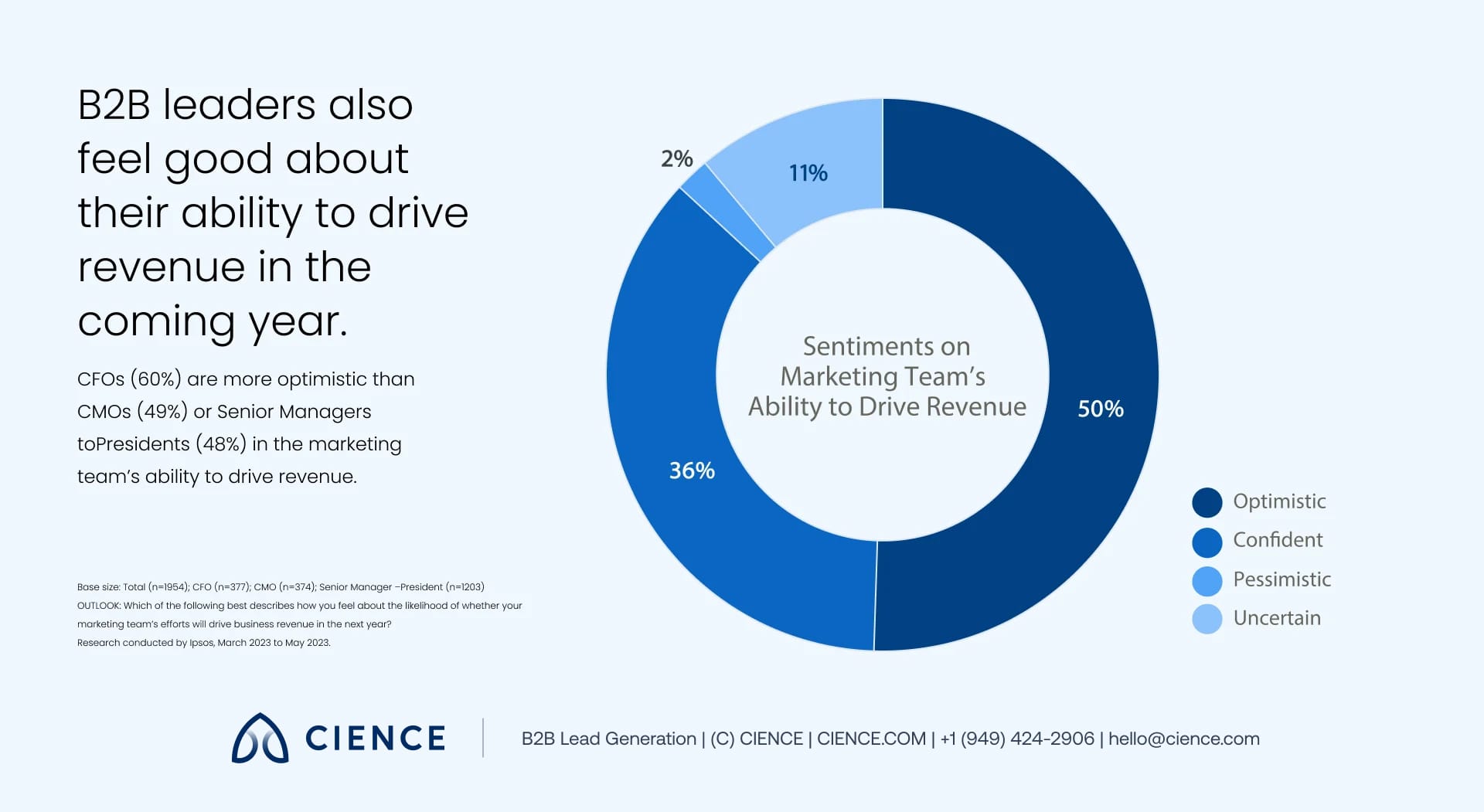
The Optimism of CFOs
In a twist that even I, as a seasoned CMO, didn't see coming, CFOs are displaying a level of optimism that outshines even their marketing counterparts. According to the LinkedIn 2023 B2B Marketing Report, 60% of CFOs express confidence in the marketing team's ability to drive revenue. This figure stands in stark contrast to the 49% of CMOs who share the same sentiment. It's a surprising development, to say the least. I must admit, I never thought I'd see the day when CFOs would be more bullish about marketing's revenue-driving potential than us CMOs.
So, what's behind this newfound optimism among the finance leaders? A significant part of it can be attributed to the technological innovation that has swept across the marketing landscape in recent years. The advent of advanced marketing technologies has not only expanded the mediums for marketing and advertising but also improved their effectiveness. As a result, marketing tactics have become more efficient and impactful, leading to increased confidence in their revenue-generating potential.
This mimics the CIENCE product release schedule as CIENCE GO Expert AI and CIENCE GO Campaign AI are proving to be marketing tools that benefit the marketing teams using them, but these are still early days.

Finance, Spoken Here
The report also reveals that 80% of B2B CMOs have learned "the language of finance." This development is crucial as it bridges the gap between the marketing and finance departments, fostering better understanding and collaboration. It's a trend that I've observed in my own interactions with our finance team at CIENCE. As we marketers become more fluent in financial terms and concepts, we're better equipped to demonstrate the value of our initiatives in terms that resonate with our CFO counterparts.
This shift in perspective is not just about numbers and data. It's about a fundamental change in how we view and value marketing's role in driving business growth. As the report indicates, nearly one in two B2B CMOs and CFOs surveyed said, "The CMO role has evolved to have a more direct role in driving revenue and growth." It's a sentiment that I wholeheartedly share and one that underscores the evolving dynamics in the boardroom.
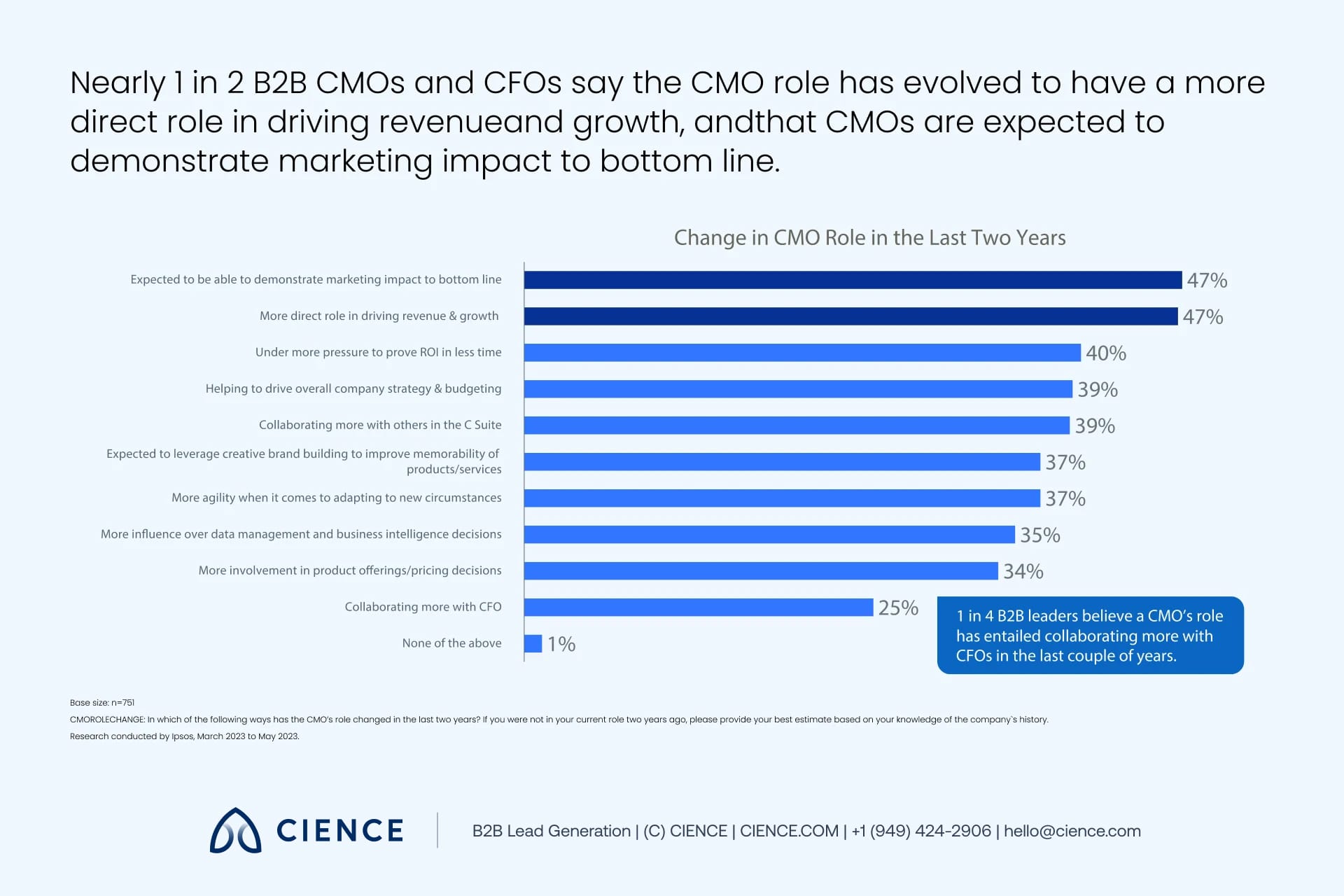
The Evolving Role of the CMO
The role of the Chief Marketing Officer has always been dynamic, but recent trends indicate a shift that is more profound than ever before. As the LinkedIn 2023 B2B Marketing Report suggests, the role of the CMO has evolved to have a more direct role in driving revenue and growth. This evolution is not just about a change in responsibilities or an expansion of the marketing function. It's about a fundamental shift in how the role of the CMO is perceived and valued within the organization.
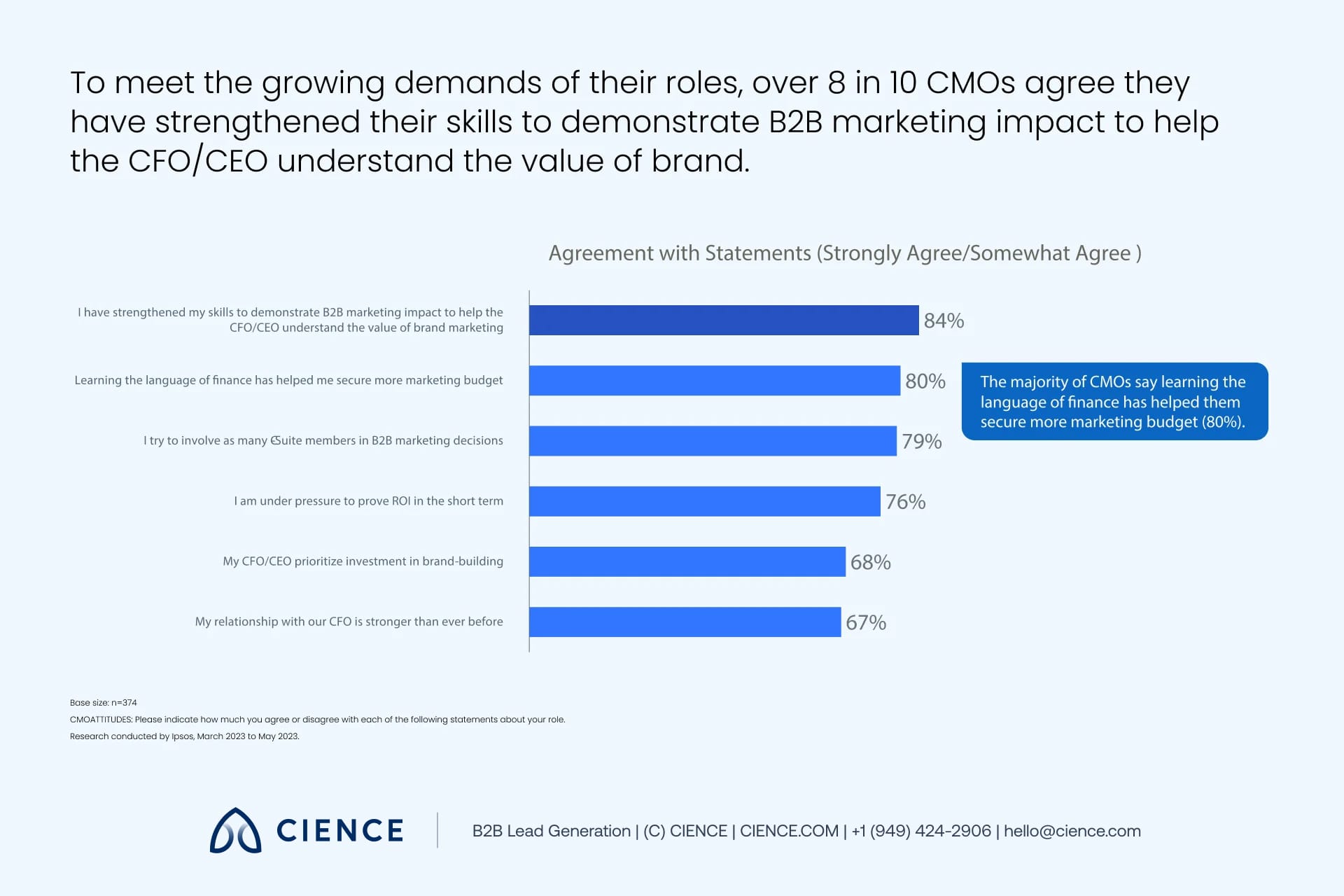
In my own experience as a CMO, I've noticed that our roles are expanding beyond the traditional boundaries of marketing. We're no longer just the custodians of the brand or the orchestrators of campaigns. We're now expected to be growth drivers, strategic advisors, customer advocates, and data analysts. We're involved in every aspect of the business, from product development to customer service to sales strategy. It's a broader purview than ever before, and it's reshaping the way we approach our work.
This expanded role comes with its challenges, of course. We're being asked to do more, often with the same resources. We're navigating the complexities of new technologies, grappling with data overload, and striving to keep up with rapidly changing customer expectations. But it's also an exciting time to be a CMO. We have more opportunities to influence business strategy, drive innovation, and make a real impact on business performance.
The evolution of the CMO role reflects a broader shift in the business landscape. As businesses become more customer-centric, the importance of marketing in creating value and driving growth becomes increasingly evident. It's a trend that's likely to continue, and as CMOs, we need to be ready to embrace our expanding roles and the opportunities they bring.
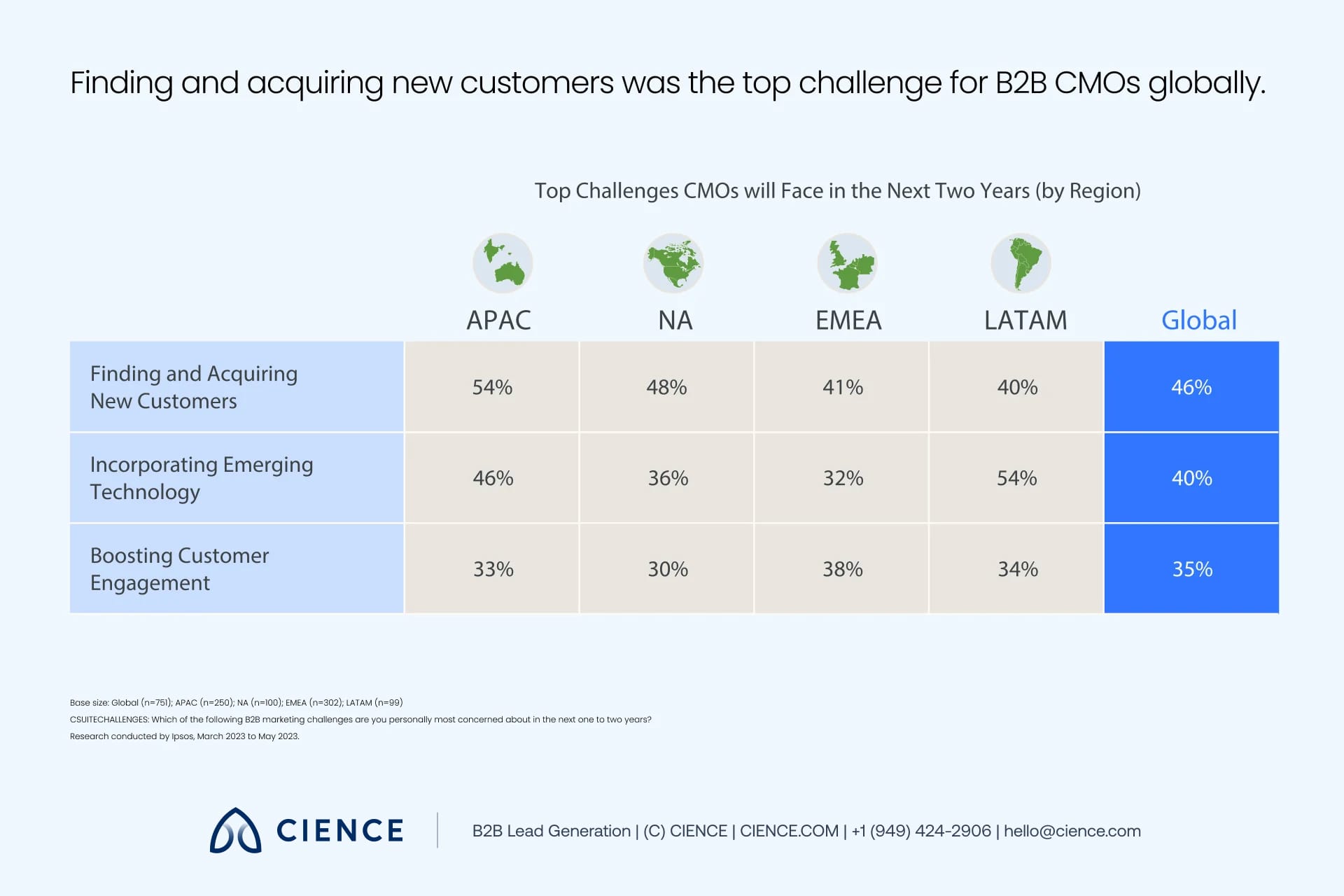
The Challenge of Customer Acquisition and How CIENCE Can Help
One of the key findings from the LinkedIn 2023 B2B Marketing Report is that finding and acquiring new customers remains the top challenge for B2B CMOs globally. In an increasingly competitive and dynamic business landscape, attracting the right customers and convincing them to choose your offerings over others is no small feat. It requires a deep understanding of your target market, a compelling value proposition, and a strategic approach to outreach and engagement.
This is where CIENCE comes in. As a company that specializes in helping businesses find and acquire new customers, we understand the complexities and challenges of customer acquisition. With over 2,500 clients ranging from small businesses to Fortune 500 companies, we have a proven track record of helping companies win net-new revenue.
At CIENCE, we solve the problem of not enough leads. We fill sales pipelines with new appointments, enabling companies to sell more and hit their sales forecasts. Our multi-channel outbound approach and comprehensive software platform, CIENCE GO, allow us to better target leads that will turn into opportunities and be more effective at starting sales conversations.
Our value proposition is simple yet powerful: The CIENCE team of experts and purpose-built software can help you identify and engage with your ideal prospects, ultimately driving growth for your business. We take the guesswork out of customer acquisition, providing you with the tools and expertise you need to attract and convert high-quality leads.
In a world where finding and acquiring new customers is the top challenge for B2B CMOs, partnering with a company like CIENCE can give you the edge you need to overcome this challenge and achieve your growth objectives.
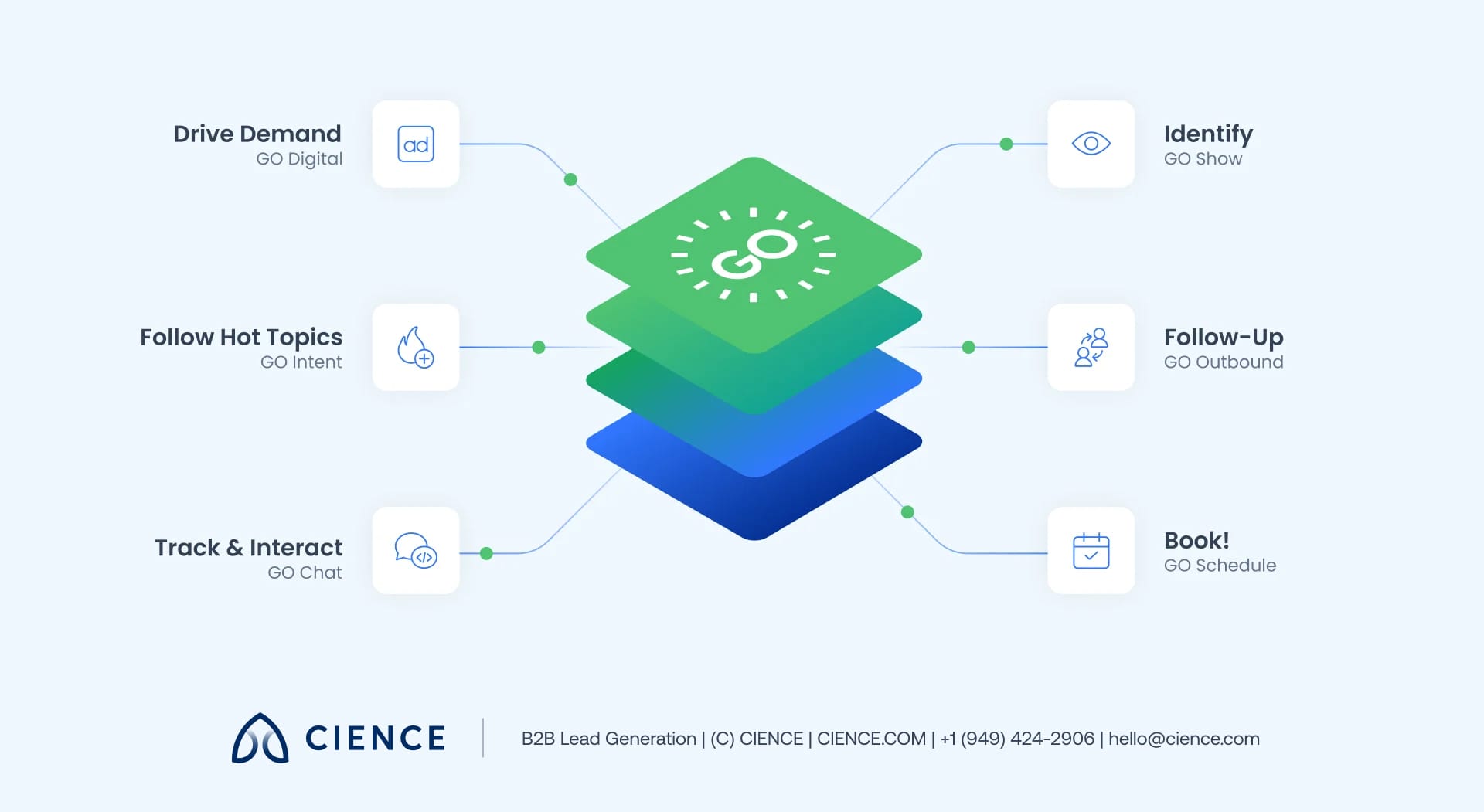
The Power of Combining Customer Acquisition and Emerging Technology
In today's fast-paced business environment, the ability to effectively find and acquire new customers while incorporating emerging technologies into the marketing mix is a powerful combination. According to the LinkedIn 2023 B2B Marketing Report, these two areas are top priorities for B2B CMOs, with 46% focusing on customer acquisition and 40% on the integration of technologies like AI.
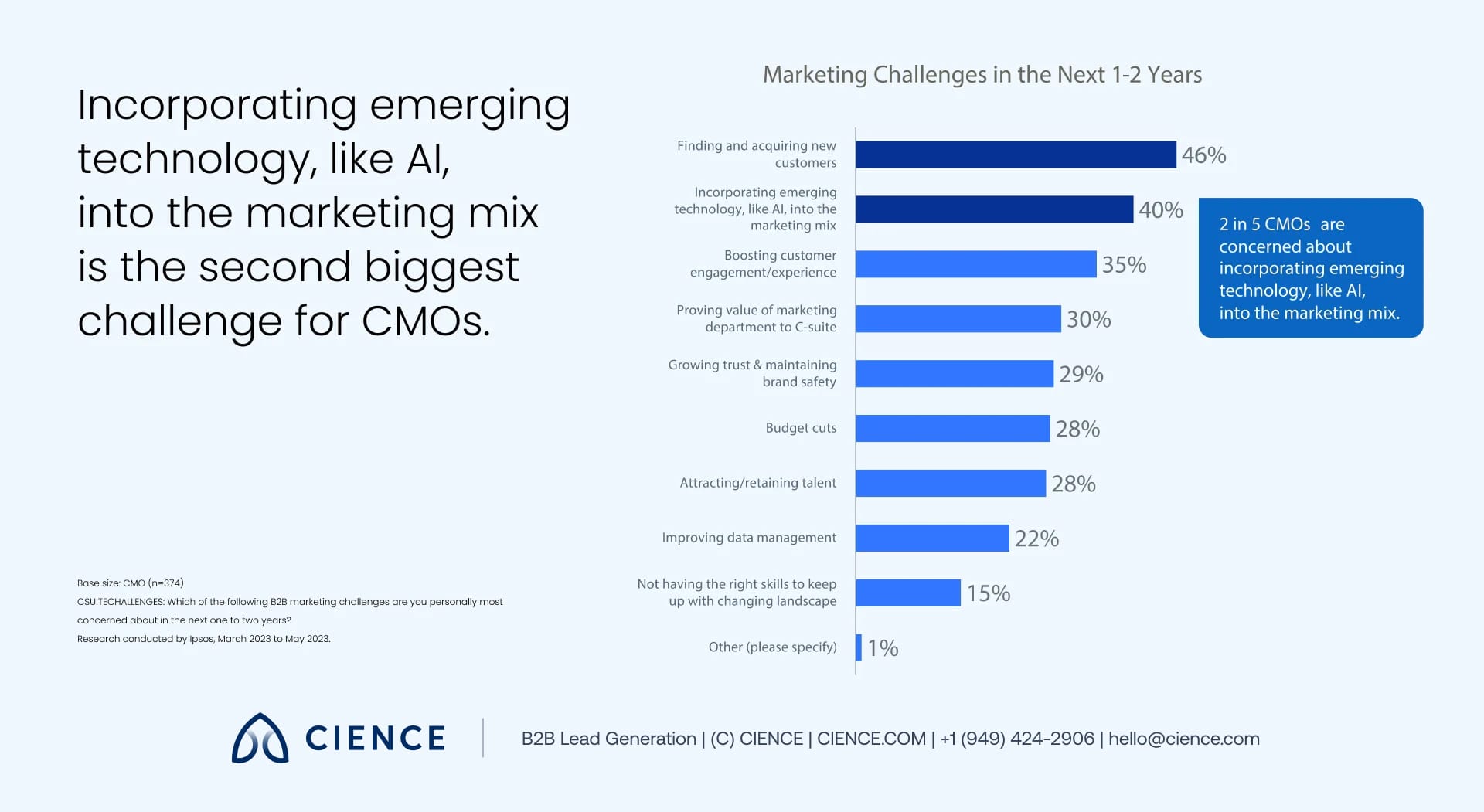
As a CMO myself, I understand the immense potential that lies in the intersection of these two priorities. The ability to leverage advanced technologies like AI can significantly enhance our customer acquisition efforts, enabling us to target the right prospects, personalize our outreach, and optimize our marketing strategies based on data-driven insights.
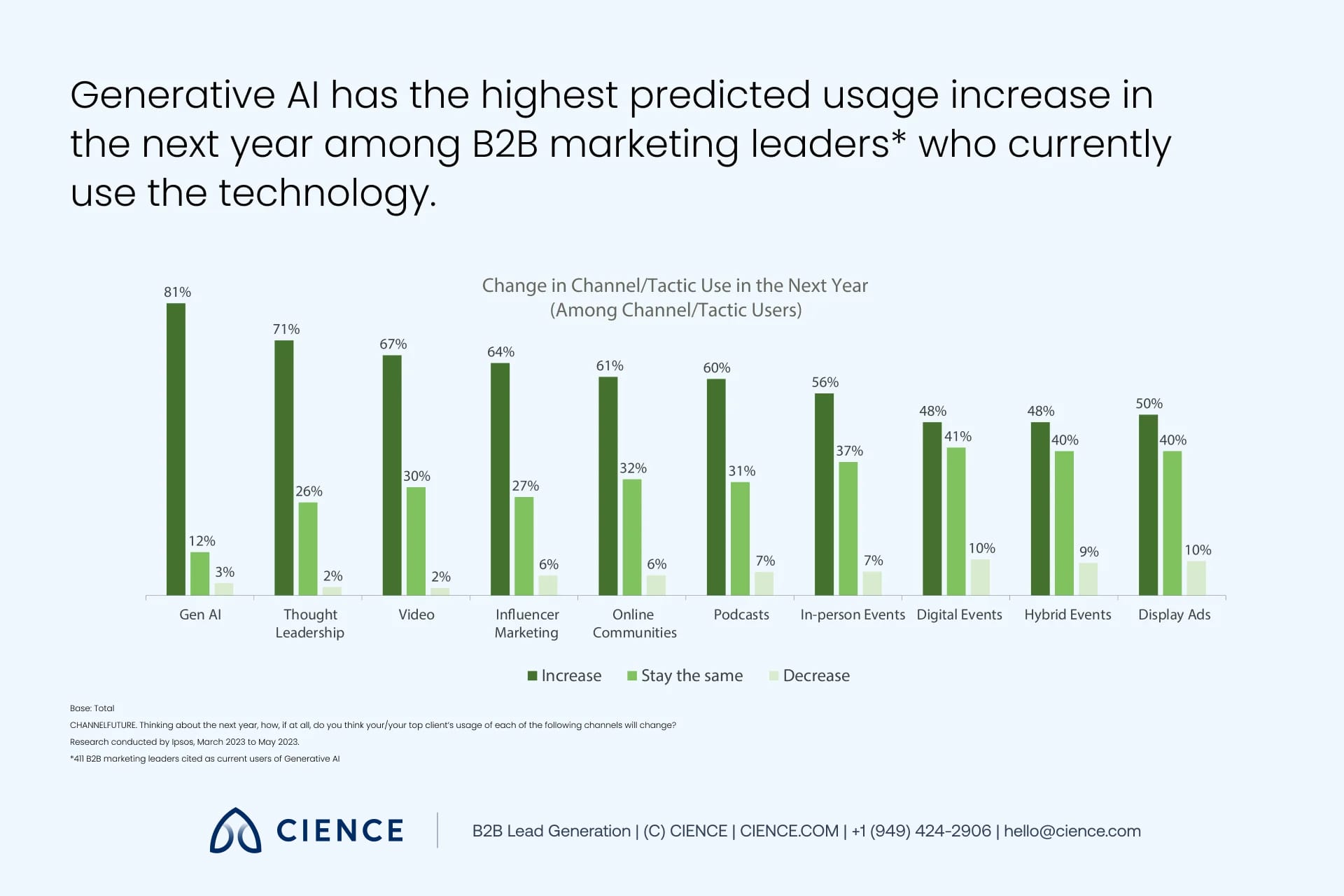
At CIENCE, we've made this powerful combination a reality. Our comprehensive software platform, CIENCE GO, incorporates Generative AI to enhance our customer acquisition services. Our AI tool, GO Campaign AI, is designed to analyze and learn from campaign data, helping us to better target leads and start sales conversations. It's a game-changer for our clients, enabling them to not only find and acquire new customers but also to do so in a more efficient and effective way.
By combining customer acquisition and emerging technology, we're not just helping businesses to sell more and hit their sales forecasts. We're also helping them to stay ahead of the curve, leveraging the latest technologies to drive growth and success in an increasingly competitive business landscape. It's a double-play that every forward-thinking CMO should consider, and it's what we deliver at CIENCE.
The Impact of Technology on B2B Marketing
The digital revolution has left no industry untouched, and B2B marketing is no exception. The LinkedIn 2023 B2B Marketing Report highlights the increasing reliance of CMOs on emerging technologies like generative AI, modernized Martech, and Blockchain to boost their marketing strategies and expand their influence.
Generative AI, with its ability to create content, design layouts, and even generate marketing strategies, is proving to be a game-changer. It's enabling marketers to automate routine tasks, freeing up time for more strategic initiatives. More importantly, it's helping us to personalize our marketing efforts at scale, delivering the right message to the right person at the right time.
Modernized Martech, on the other hand, is providing us with the tools we need to streamline our marketing processes, analyze our performance, and make data-driven decisions. From CRM systems to marketing automation platforms to analytics tools, Martech is transforming the way we plan, execute, and measure our marketing campaigns.
It’s interesting to see the list — Linkedin data from across 922M registered users — of Top Engaged Hashtags… As tech trends dominate the list:
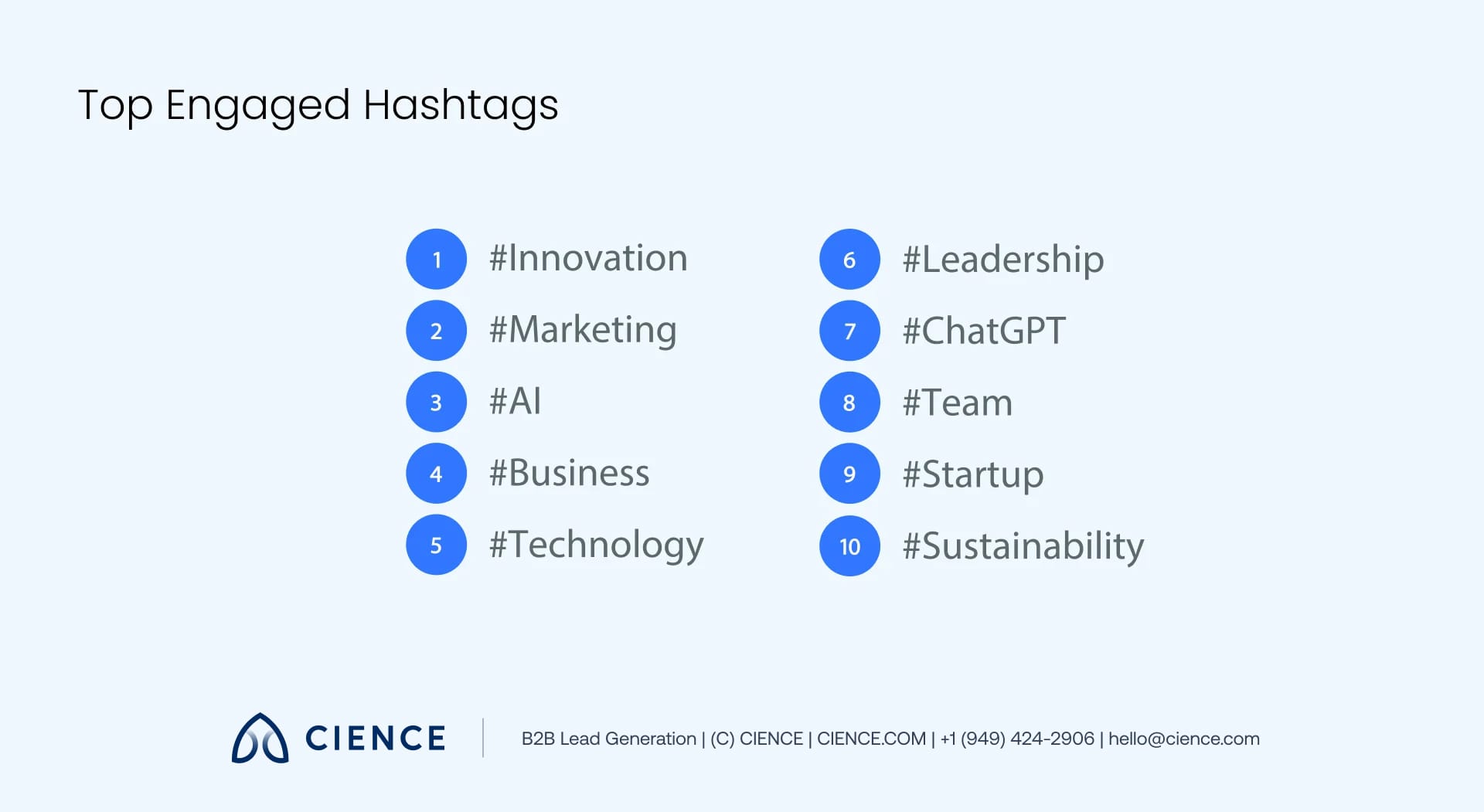
The Rise of Martech Spending
In a time of economic uncertainty, one might expect businesses to tighten their belts and cut back on spending. However, the LinkedIn 2023 B2B Marketing Report reveals a counterintuitive trend in the realm of B2B marketing. Despite the economic headwinds, businesses are not just maintaining their marketing budgets; they're increasing them.
Data from eMarketer and Marketing Charts shows that B2B spending on martech in the U.S. has jumped from $4.75B in 2020 to $6.59B in 2022. Even more surprising, it's projected to reach $8.51B in 2024. This significant increase in martech spending is a testament to the growing recognition of the value of marketing technology in driving business growth.
This trend is not just about investing more money into marketing. It's about investing smarter. Businesses are recognizing that the right martech can enhance their marketing effectiveness, streamline their processes, and provide valuable insights to inform their strategies. It's about leveraging technology to get more bang for their marketing buck.
The rise in martech spending is a clear indication of the direction in which B2B marketing is heading. As businesses continue to navigate the complexities of the digital age, the role of technology in marketing is only set to grow. As CMOs, we need to stay ahead of this trend, understanding the potential of martech and making strategic investments that will drive our marketing success in the future.
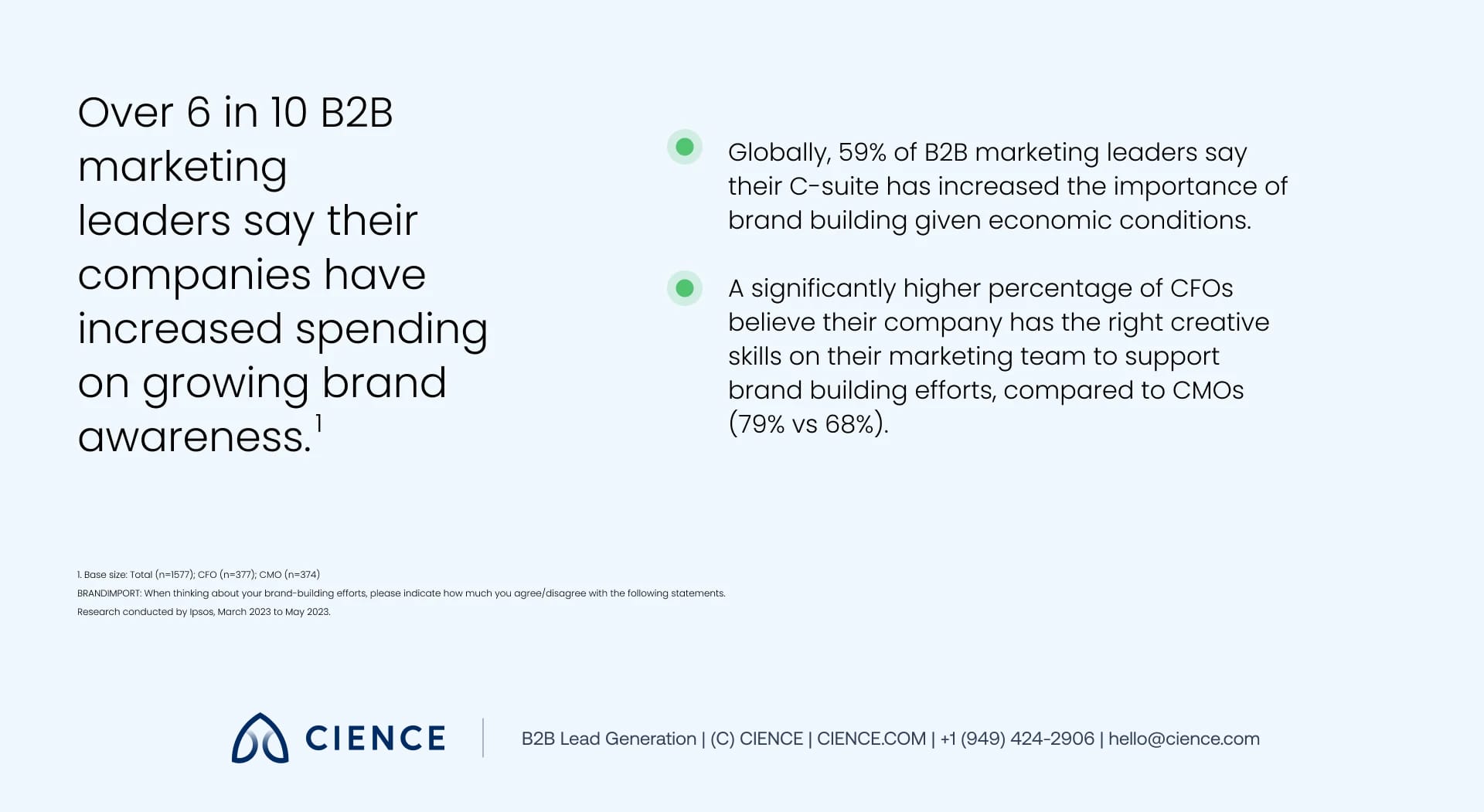
Employ B2B Marketing Trends for Enhanced Business Growth
The LinkedIn 2023 B2B Marketing Report provides a wealth of insights into the current state and future direction of B2B marketing. Despite economic challenges, B2B marketing budgets are on the rise, reflecting a growing confidence in marketing's ability to drive revenue and growth. CFOs are showing surprising optimism, often outpacing their CMO counterparts, thanks to the transformative impact of technological innovation on marketing effectiveness.
The role of the CMO is evolving, expanding beyond traditional boundaries to encompass a broader range of business functions. Today's CMOs are expected to be growth drivers, strategic advisors, customer advocates, and data analysts, involved in every aspect of the business.
Emerging technologies like generative AI, modernized Martech, and Blockchain are becoming integral to B2B marketing strategies. These technologies are not only enhancing the efficiency and effectiveness of marketing efforts but also reshaping the marketing landscape in profound ways.
The rise in martech spending, despite economic headwinds, underscores the growing recognition of the value of marketing technology in driving business growth. Businesses are not just investing more in marketing; they're investing smarter, leveraging technology to get more bang for their marketing buck.
At CIENCE, we're at the forefront of these trends, leveraging advanced technologies like AI to enhance our customer acquisition services and deliver better results for our clients. As we navigate the complexities of the B2B landscape, we remain committed to helping our clients stay ahead of the curve and achieve their growth objectives.
The future of B2B marketing is here, and it's more exciting than ever. As we embrace our expanding roles, leverage emerging technologies, and make strategic investments in martech, we're not just adapting to change; we're driving it. And in doing so, we're shaping the future of B2B marketing.
